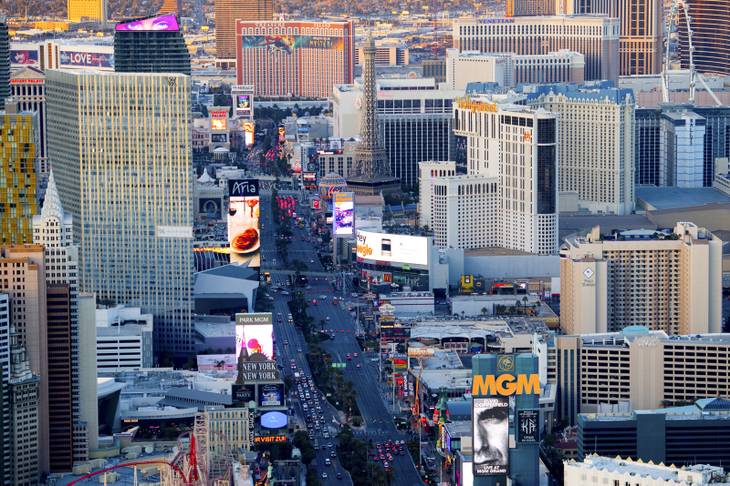Don’t expect the gaming and cannabis industries to mix anytime soon in Las Vegas.
At least, not in any official sense.
That was the main takeaway during a panel discussion on cannabis and gambling Wednesday at the International Conference on Gambling & Risk Taking at Caesars Palace.
While there remains a line between gaming, a well-regulated and mature industry in Nevada, and marijuana, an industry in its infancy in the state, the consensus among Wednesday’s panel-members seemed to be that the two will remain segregated for the foreseeable future.
“The relationship with marijuana has been a concern for our gambling operators because the Gaming Control Board enforces a policy of strict regulation,” said Jennifer Roberts, an attorney and the associated director for UNLV’s International Center for Gaming Regulation. “That has impacted how we look at the cannabis industry in Nevada. There are some legal issues there.”
The biggest issue is that the federal government still considers marijuana to be an illegal drug, at least recreationally. With 10 states in the U.S. now allowing for the legal use of recreational pot — Nevada joined the list in 2017 — some state laws are at odds with the feds.
As Roberts pointed out, it could conceivably end up being a big deal if a Nevada gaming license holder associates with a known criminal, even if that criminal is only using some marijuana for recreational purposes.
“Gambling operators (in Nevada) are licensed with the requirement that they have to comply with all state, federal and local laws,” Roberts said. “If they were to allow customers to come in and possess and use a controlled substance, that puts them at legal risk. That’s the mindset. I’m not saying it’s an accurate mindset, but that’s what we’re faced with in the gaming world.”
It’s something that the casinos take seriously here, Roberts said, even though the smell of marijuana isn’t exactly rare along the Strip or in its parking garages.
“If you have somebody coming in to gamble at your premise, you actually have to report if you know they own a marijuana business,” Roberts said. “In that case, you know they are violating federal law, so you would have to file a suspicious activity report. I’ve seen it where, if money smells like marijuana, they expect you file a report.”
Related Content
The one area where there could be some overlap between the two industries in Las Vegas, according to Nevada gaming regulations, would be with regard to casino properties hosting cannabis conventions.
While it’s not a rule-making body, the state’s Gaming Policy Committee previously suggested that all licensees could host such a convention, but that federal law could not be broken.
Basically, that means no using or moving marijuana products.
“Could you have a marijuana convention?” said Tony Alamo, the Nevada Gaming Commission chairman. “You could, but are you assured that all federal, state and local municipality laws within the sidewalks of the gaming property will be upheld? At the end of the day, that’s a question for each licensee. That’s how we left it.”
Another of the three-member panel on Wednesday, Timothy Fong, co-director of the Gambling Studies Program at UCLA, said there are also still lots of questions about how legalized marijuana will affect gamblers.
“For years, people thought that cannabis is not associated with risk-taking and that’s absolutely false,” Fong said. “In a lot of the extreme sports, snowboarding for one, cannabis is used almost as a performance-enhancer in order to deal with the risk-taking.”
As Fong pointed out, social attitudes about the use of marijuana have shifted drastically in recent years in the U.S.
It seems like cannabis might be here to stay in mainstream American culture, which means that all industries, gaming included, will likely have to co-exist with weed being out in the open.
For instance, the city of Las Vegas recently passed a resolution allowing for a limited number of social-use cannabis lounges, which are expected to begin to spring up later this year.
“Cannabis, as an industry, is way out ahead of us,” Fong said. “The barn door is open and the horse is two miles ahead. We’re all still in the barn. Actually, we’re not even in the barn yet.”
As far as seeing the gaming industry in Nevada warm to the idea of legal weed, Roberts said that doesn’t seem realistic while federal laws remain the way they are on pot.
“The federal law is what’s stopping (casinos) from integrating cannabis,” Roberts said. “That and the Gaming Control Board telling the establishments to not go there. I will say that federal laws are difficult to change. You’re still not seeing politicians out there talking about getting rid of marijuana from Schedule I, though I think a lot of people would like to see that change.”
